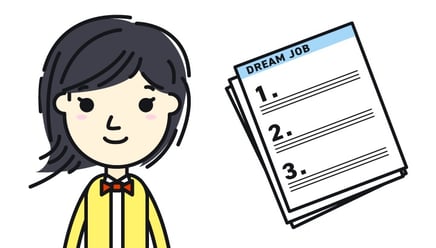Answering Tough Job Interview Questions
Difficult job interview questions follow certain patterns. If you know the three general categories that these questions fall into, you can prepare ahead of time to give effective answers.
The personal failure category
"What skills are you lacking?" "Tell me a time when you failed." "Why do you have a gap in your work history?" "What would the colleague who likes you least say about you?"
Job interview techniques to answer this type of question include lining up a couple of somewhat palatable shortcomings in your mind. Do not mention your tendency to procrastinate, overspend, or accumulate stacks of parking tickets in your glove box. Instead, pick a weakness that’s relatively unthreatening to an employer. The safest choice is something along the lines of, “I tend to work too hard,” or “I can be impatient when working on a deadline, because I get fixated on getting it in on time,” Then have a line ready about how you work on improving this tendency.
In her book 301 Answers to Tough Job Interview Questions, Vicky Oliver recommends addressing gaps in your work history with a clear list of what you were doing during that time. Volunteering, consulting, or freelance work are all good answers to this question. A cover letter for freelancers can even highlight these experiences. If you don’t have anything work-related to mention, taking care of a family member is a reasonable explanation. It’s good to add that you no longer have those caretaking responsibilities.
The “Sell me on you” category
"Tell me about yourself." "Why should I hire you?" "What are you most proud of?" "What’s the biggest risk you’ve ever taken?"
These are not tough job interview questions, but it’s easy to answer them badly by being too wordy. Practice a 1 or 2 minute speech covering topics such as your early years, education, job history, and recent career-related experience.
Ritika Trikha, writing in U.S. News, recommends choosing one single accomplishment ahead of time that you’ll be able to summarize in case you are asked “What are you most proud of?” Include an outcome of how you helped your company’s bottom line or how it met a goal you had set.
To prepare an answer for “Why should I hire you?” research the scope and duties of the position you’re applying for as closely as possible. Create a clear mental outline of how your skills and experience fit those duties, so you can explain why you are the best person for this job.
The previous job problem category
"Was there anything about your previous job that was unfair?" "Did you ever disagree with your team?" "With your supervisor?"
Prepare a narrative in your mind about your previous job. Take an aspect of it that was difficult and develop a clear storyline about where the difficulty originated (without saying anything too negative about supervisor or coworkers), what action you took to resolve the problem, and what the (positive) outcome of your action was. In other words, be prepared to answer this in a way that ends with what you learned, and that sounds personally generous to people you had trouble with.
According to Forbes Magazine these queries about your previous job can be tricky to navigate. They recommend that if you need to highlight something problematic about your previous job, outdated technology is a safe item to blame.
Contact us today to learn more.
Betsy S is a freelance writer available on WriterAccess, a marketplace where clients and expert writers connect for assignments.
___________________________________
Artisan Talent is a Digital, Marketing and Creative Staffing Firm placing talent in jobs perfectly matched with their skills all over the US. For available jobs, to submit your resume, or learn more about working with Artisan Talent, contact us here.
Connect with Us
Linked In| Glassdoor| Facebook | Twitter | Instagram | Pinterest


